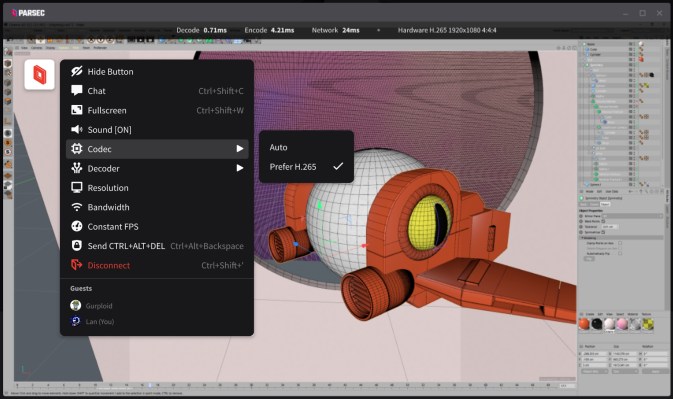Unity, the company behind the super popular 2D/3D engine of the same name, is today announcing plans to make its biggest acquisition to date. Unity says it will acquire Parsec, a remote desktop tool for developers and creatives, for $320 million in cash.
Parsec’s pitch has long been remote desktop access without compromise. Tuned for creatives, it works fine even if your rig has multiple high-resolution displays. It’ll stream your work-in-progress artwork without screwing up the colors, and it’ll play friendly with fancier input devices like pressure-sensitive drawing tablets.
Parsec began its life back in 2016, initially focused on helping gamers stream games from their powerful PCs to other (generally less powerful) devices. It turns out the same things that made it good for game players — low latency, high-resolution display support and compatibility with all kinds of different input devices — made it good for game makers as well. After noticing a number of users across the creative industry tapping Parsec to beam into their workstations, the company started rolling out plans and features just for creative teams. When the pandemic sent more teams home and away from their office setups, usage of Parsec took off.
“We believe that, more and more, creators will need to be able to work anywhere,” Unity Senior Vice President Marc Whitten told me in a call earlier this week. “They’re going to work in groups that are dispersed by distance, or they’re going to be in a hybrid environment where they might be working in the office sometimes and at home sometimes.”
“I think that’s going to mean that those creators are going to need to have access to the power they need on the glass that they have, wherever they are,” he added. “And Parsec is a great example of a company that has just deeply innovated in that space.”
Whitten also alluded to this being the beginning of a deeper cloud push for Unity: “I think you’re gonna see that Parsec is a great foundational block for a broad sort of cloud ambition that we have as a company,” he said. “You’re going to see a lot more from us in that particular regards.”
Parsec’s total funding before the acquisition was $33 million, according to Crunchbase. Its most recent funding was a $25 million Series B led by Andreessen Horowitz last December.
Whitten told me that he doesn’t foresee any changes for existing Parsec users, but couldn’t comment yet on any potential changes to subscriptions/pricing.
Update: For anyone concerned about losing access to Parsec’s free offering, the company tweeted to confirm it has “no plans to change anything about the free Parsec app.”
